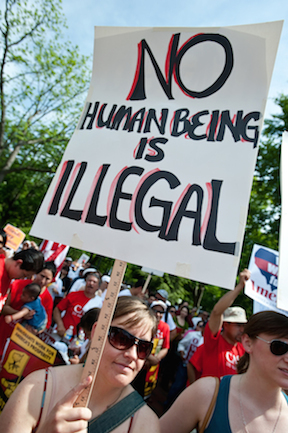Private prison business still booming a year after Biden’s executive order
In the year since President Joe Biden signed an executive order to stop the Justice Department from using private prisons, a multibillion-dollar private prison company has found an “opportunity” for new business in detaining and tracking immigrants because of the immigration court backlog that has only been made worse by the covid-19 pandemic, new documents reveal.
GEO Group detailed in a previously confidential document that “Border Inflow” creates an “opportunity for GEO” to increase its federal business — with a particular focus on its “electronic monitoring business” — in the wake of the executive order, which has already cost the company contracts worth roughly $125 million.
The order, hailed by the Biden administration as part of its racial equity efforts, aimed to decrease the federal government’s use of private prisons by banning the Justice Department from renewing contracts with “privately operated criminal detention facilities.” The order followed a 2016 Justice Department Inspector General’s report that found significant safety issues at private prisons utilized by the Bureau of Prisons (BOP).
But the order had significant limits, and companies have used those limits and found workarounds — with some success — to stay in business with the feds. A recently filed financial disclosure by one such company, GEO Group, details the extensive nature of these efforts to “[continue] to win new business as it markets facilities to other federal and state agencies that are facing increased capacity constraints.”
The previously confidential document was submitted to the Securities and Exchange Commission earlier this month. In it, GEO Group was quite clear about its overarching strategy: The company plans to use those workarounds, immigration detention contracts and increased reliance on its electronic monitoring business (known as BI Incorporated) to maintain its federal business interests despite Biden’s order.
Eunice Cho, a senior attorney with the American Civil Liberties Union’s National Prison Project, said the documents “really confirm what our worst suspicions were.” Cho reviewed the documents and spoke with Grid about what they show — in her words, “a shell game with the government to counteract really hard-won efforts to reduce incarceration, repurpose facilities and think about shrinking the impact of mass incarceration in our society.”
From Grid News
From Grid News
